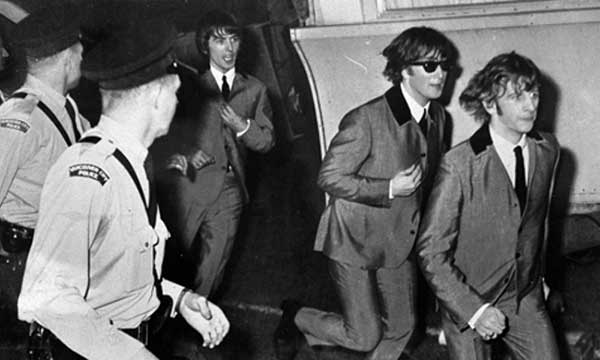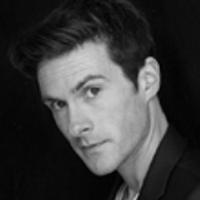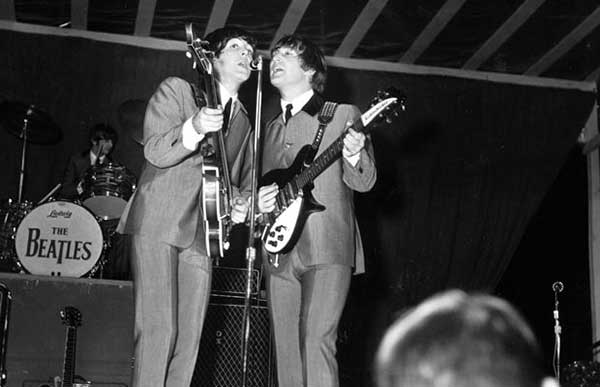"There's no comparison with any other crowd I've seen -- at least the others still could think to some degree. These people have lost all ability to think." -- Bud Errington in the pages of the Vancouver Sun, Aug. 23, 1964.
Though it was 50 years ago this week, Brian Henderson vividly remembers the night the Beatles played Vancouver's Empire Stadium.
It was Aug. 22, 1964, and 17-year-old Henderson was selling programs, working, as he often did, at the Pacific National Exhibition. That evening at the stadium was different from the usual fare of soccer and BC Lions games. More than 20,000 people filled the stands, predominantly girls between the ages of nine and 13, with a few boys and men sprinkled throughout. The atmosphere was electric.
Security at Empire was tight, with over 100 police officers and multiple "crush barriers" separating the audience from the stage. (It was so tight, in fact, that at first MC Red Robinson wasn't allowed in to speak to the band.) Impatient fans endured more than an hour of opening acts, including Jackie deShannon and the Bill Black Combo. By 9 p.m., every one of the seats was full, and the Fab Four took the stage at precisely 9:23 p.m. The result was unmitigated pandemonium.
"As soon as they hit the stage, it was like a jet engine taking off," Henderson chuckles. "It was just this atavistic roar. I made sure I got down right by the front. And when they came on -- boom. Everybody rushed up to the fences. I started telling the security guys, 'Hey! People are trying to steal my money!' So they pulled me over the fence. Then I climbed over the other -- there were two rows of fencing -- and sat down with my back against the fence and watched the show right from the front. I was the closest person in the stadium."
That vantage point may have made Henderson one of the few people in attendance who could actually hear the band. As was common at Beatles shows in the mid-1960s, the shrieking of hysterical fans easily overpowered the group's amplifiers, making the music all but inaudible.
"It was fine until the show started," recalls Patty Young, then 19, who was at the concert with her younger sister. "The other acts were on, and everything was fairly normal. Then, the audience just started screaming. And they kept screaming throughout the whole show. We couldn't hear anything except screaming. It was constant... We were less than three feet from the speaker, and we couldn't hear anything at all."
Fans leapt from their seats and rushed the field. A group of them broke down the venue's west gate and at least a dozen gained entry, forcing police to hold it shut with their bodies. Over the course of the quartet's 29-minute set, three people were arrested and nine were hospitalized.
"The first aid posts resembled a disaster area," wrote Stan Shillington, the Vancouver Sun's police reporter, unable to conceal his horror. "Dozens of girls slumped in chairs, or corners, or anywhere out of the way, sobbing uncontrollably. Many had been vomiting."
Meet the Beatles
This reception was hardly unusual; by the summer of 1964, Beatlemania was in full swing. A Hard Day's Night had just premiered and was already breaking box office records. The band's first appearance on the Ed Sullivan Show attracted more than 73 million viewers, at the time the largest audience in the history of television. On the American charts, they had a single in every one of the top five spots, and their newest record, Can't Buy Me Love, had already sold more than two million advance copies.
The Empire Stadium gig was the fourth stop on the Beatles' 31-day North American tour, and the band was averaging between five to eight shows per week. Everywhere they went, the reaction was the same: mass hysteria.
In Vancouver, the excitement started around 8 a.m. when 40 or 50 fans gathered outside the Hotel Georgia, where the band was believed to be staying. By late afternoon the crowd had swelled to more than 2,000. A report spread that Ringo Starr was spotted in a car on Georgia Street, leading to the prompt mobbing of a car (it turned out to be a prank perpetrated by DJ Red Robinson, who was later given a stern talking-to by police).
In reality, the band didn't arrive until 6 p.m. that evening following a gig in Seattle. The stadium wasn't ready to receive them, so they took a brief tour of the city by car. The pre-show press conference was packed. Eighty-nine newsmen crammed into a room designed for half that number, yelling their questions rapid-fire at the band, shouting over each other to be heard. The Beatles suffered it all with bemused good humour.
"What are you taking out of America, compared with Britain?" someone shouted.
"Money."
"Do you enjoy meeting all the girls?"
"We don't do it. The police do it."
"When are you going to retire, fellas?"
"In about 10 minutes."
HELP!
The Beatles weren't the first rock act to enjoy such an enthusiastic response in Vancouver. When Bill Haley and His Comets played the Kerrisdale Arena -- the city's first rock concert, less than 10 years earlier -- teenagers leapt from their seats and danced, completely disregarding the protests of security personnel. Fans nearly toppled the stage when Elvis played Empire Stadium in 1957, causing a scene so raucous that DJ Fontana, Elvis' drummer, later confessed to disc jockey Red Robinson: "Honest to God, I thought we were going to die."
Musician-induced hysteria was a terrifying new phenomenon for the parents of the 1950s and '60s, causing widespread panic about rock 'n' roll's deleterious effect on adolescent minds (though, despite the fears of the older generation, similar effects can be traced as far back as Franz Liszt). In reviewing the Beatles, the Sun's William Littler could barely hide his disgust.
"As a music critic I have had to subject my eardrums to more than a little of the cacophony which currently dominates the hit parade, but the stuff shouted by these Liverpudlian tonsorial horrors left me particularly unimpressed," Littler wrote. "That is, what portion of it I could hear between choruses of deafening screams."
Though musicians playing stadiums was a relatively new development (Elvis had been the first, back in 1957), security teams had learned from previous performances and the four "crush barriers" -- the fences which allowed Brian Henderson his unparalleled access to the show -- were an attempt to improve safety. But as the set continued and fans grew more frenzied, security officials became increasingly worried. Fearing serious injuries, police chief Bud Errington and Beatles manager Brian Epstein dispatched MC Red Robinson to calm the crowd.
"Epstein is getting concerned because the crowd is moving forward, pushing," Robinson recalls. "And he said: 'Red, I want you to get up and tell the crowd to back off, or the show's ending'. I said: 'Brian, I did the Elvis show here. You don't bust into the middle of an act.' And he says: 'You don't understand, son. Have you ever been to a British football game? Waves of people push forward. People can't breathe, they fall down, other people fall on them. People die. You go up there and do something'."
I Don't Want to Spoil the Party
Nervous, Robinson waited until the end of the next number and mounted the stage.
"I hate to -- we've got to back some of the people up," he shouted into the microphone. "There have been two kids crushed already. They'll have to cancel the show. Hold it! Everybody down, or no show!"
Nobody had communicated the plan to the Beatles, and Robinson's arrival onstage seriously ruffled the feathers of guitarist John Lennon.
"When I walked up onstage, John Lennon yells: 'Get the fuck off our stage! Nobody interrupts the Beatles!'" Robinson recalls. "And I told him that Brian Epstein had sent me up. I said: 'I hosted for Elvis! I know you don't interrupt the show. What the fuck?' And I explained it to him. And he goes: 'Oh, no. Okay. Carry on, mate.'"
Robinson chuckles. "But nobody ever tells that part of the story." (Lennon later apologized, though in Robinson's mind the damage was done.)
Despite Robinson's pleas, the crowd continued to strain against the fences. Paul McCartney asked the audience to take their seats, but it was no use. The Beatles played one more song, and after 29 minutes and 23 seconds they left the stage, taking a collective bow and disappearing before fans had time to react. Within 30 seconds of their final chord, they were out the gate and on their way to the airport. Surprised at the suddenness of the departure, the crowd stormed the stage and took souvenirs.

Despite complaints that the show was too short, a standard Beatles performance had always been only 30 minutes -- by the end of their career, they would often do it in only 15. Over the course of the next few weeks, the band played a further 23 cities and earned over $1 million in ticket sales. After another two years and more than 1,400 international performances, the band retired from touring, playing their final show in San Francisco's Candlestick Park in 1966.
Good Night
International acts continued to play in Vancouver throughout the 1960s, setting the bar higher and higher for bad behaviour. In 1965, the Rolling Stones threw a CKLG recording crew out of a moving limousine, and a few years later the Who left a dead piranha in their hotel room as a present for the maid.
Ultimately, reviews of the Beatles performance that night in 1964 were mixed. Some fans, such as Patty Young, were disappointed by the shortness of the set. Various parents and authority figures were relieved.
"Every policeman there was happy they didn't have to pack away seriously injured children," Inspector Bud Errington remarked to the Sun. "One hundred policemen were there -- that's all that stood between the way it wound up and a national tragedy."
The Sun was similarly unimpressed.
"I do not know how it came, why it came and when it will go away," critic Littler concluded. "But go away the Beatle phenomenon will, and with it will go the Beatles. The day has yet to come. When it does, music lovers everywhere can rejoice -- yeah, yeah, yeah."
Henderson, however, was "high as a kite."
"It was an incredible night," he concludes. "I've been to a lot of concerts, like Zeppelin in Vancouver. But nothing hit me like that 25 minutes that they were on." ![]()
Read more: Music

















Tyee Commenting Guidelines
Comments that violate guidelines risk being deleted, and violations may result in a temporary or permanent user ban. Maintain the spirit of good conversation to stay in the discussion.
*Please note The Tyee is not a forum for spreading misinformation about COVID-19, denying its existence or minimizing its risk to public health.
Do:
Do not: